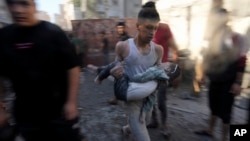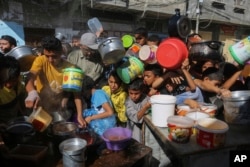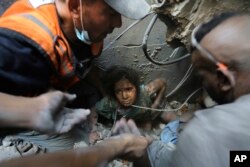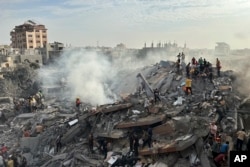Jason Lee, director for the Palestinian Territories for Save the Children, has called for an immediate cease-fire in the war between Israel and Hamas. He says that children in Gaza are paying a heavy price in the conflict, and that all parties must be held to account for meeting the obligation to protect all the children, all the time. He spoke with VOA’s Keida Kostreci via Zoom. The transcript has been edited for length and clarity.
VOA: Mr. Lee, U.N. Secretary-General Antonio Guterres described Gaza as a graveyard for children as the number of children losing their lives increases every day. In fact, two of every five civilian deaths every day are among children. What is your organization's assessment of the situation on the ground?
Jason Lee: The situation in Gaza is dire and getting worse. We are now at a situation where one child is killed every 10 minutes and one child is injured every five minutes. And these are life-changing injuries. Aside from the deaths and injuries that children are enduring, there are 1.5 million people — that’s 60% of the population of Gaza — that have been displaced, so they fled their homes. They're looking for refuge in schools and hospitals, in any building that they can be safe. But these buildings do not have enough water, do not have enough food. And there is no access to medical care for children and the families that have been injured. Many families are resorting to eating one meal a day.
There is no fresh water in Gaza. When you look at the schools that civilians are living in now, many of them are four times the capacity. In one center in Khan Yunis, in the south of Gaza, there are 22 and a half thousand people living in the school. The school is designed to host a maximum of 2,000 people.
There are 16 bathrooms for over 22,000 people, which means that they cannot maintain proper hygiene standards. So, there are communicable diseases, diarrheal diseases, that are all spreading.
And of course, there is not enough water. The water consumption for people in Gaza is reduced by 92% since the levels pre-October 7. This is a humanitarian catastrophe, and children are paying the price.
VOA: In terms of short-term and long-term consequences, what does it do to the lives of children?
Jason Lee: I cannot underscore the longer-term mental health impact that this is having on children. Unfortunately, for children in Gaza, this is not the first war that they've been through. There's been previous escalations, and we know the impact of this. Save the Children has been doing research and studies and talking to children. And we see the increased levels of anxiety, of depression, of fear, children that have difficulty sleeping.
Children that are starting to withdraw from their families, feeling alone. But worst of all, children are losing trust and hope. They do not believe that they have a future.
Unfortunately, this will be the legacy of the international community if we do not get all sides to adhere to international humanitarian law and to protect civilians. Children would not only have the physical scars, but they will have the mental and emotional scars that they will carry with them and not have any hope for a future.
VOA: Eighteen U.N. organizations and other aid groups have asked, precisely because of this situation, for humanitarian cease-fire. On the other hand, Israel is saying that it's targeting Hamas, and a cease-fire would embolden Hamas. How could you put it in terms of the work that you do? Is a cease-fire possible without having other consequences on the ground and emboldening Hamas?
Jason Lee: A cease-fire is not only possible, but essential. There is no safe space in Gaza right now. Gaza has 2.3 million people, half of them being children. So, there are 1.1 million children that are currently impacted. It is one of the most densely populated places on earth. And there is no way in the north or the south that is safe.
The civilian death toll and injuries tell you this.
Two out of every three deaths have been a woman or a child. Now, it is essential that we have a cease-fire because that is the only way that we can protect civilians. It is also critical for a cease-fire because one, humanitarians cannot deliver assistance when there are ongoing airstrikes and shelling.
Civilians cannot get to safety. Civilians cannot get to the distribution points where we have to distribute water and food. We also need to identify the most vulnerable children. There are many children and their families that have been unable to make it to shelters because they have elderly members of the family, children with disabilities. They cannot leave their homes. So, it is critical that the cease-fire is there to enable, again, first and foremost, protection of civilians, but also for humanitarians to be able to deliver the assistance.
VOA: One could say that to have a cease-fire, there should also be good faith. And the U.N. itself and other organizations are saying that Israeli airstrikes are causing this strife to civilians, especially the most vulnerable. But on the other hand, Hamas is using Palestinians as human shields. Do you think it's possible to do in this situation of distrust and the overall situation between the strikes and Hamas's role on the ground?
Jason Lee: As I said, this is why it is critical that all sides adhere to international humanitarian law and prioritize the protection of civilians. There is nowhere for residents of Gaza to hide. There is no safe space. It is a very small area of land. There is absolutely nowhere for civilians to go. This is why it is critical that all sides respect international humanitarian law, meet their obligations to protect children, get the rights of children applied to every single child no matter who they are, or where they are and in what circumstances. Every single right is applied to every single child all of the time. We do not get to pick and choose which rights for which children and which times that we will protect. This is why the cease-fire is critical for all sides to protect civilians and make sure that children are safe, kept alive and we are allowed to deliver the lifesaving systems that they need.
VOA: While the U.S. has been pushing for humanitarian pauses, Prime Minister [Benjamin] Netanyahu said Israel may allow small tactical pauses, an hour here and there. Is that enough? Would that alleviate the suffering?
Jason Lee: Again, we need a cease-fire. It is impossible for humanitarians and for civilians to reach safety. Right now, there is nowhere that civilians can go to. They are seeking shelters in whatever building they can find. We also need, as humanitarians, to transport goods. We need to set up distribution points. We need to monitor. We need to find the most vulnerable children to deliver assistance.
This is why the cease-fire is a necessity. It is not something that is convenient for us to do so it is necessary to continue saving lives. I want to stress, children in Gaza do not have time. Two weeks ago, it was one child that was killed every 15 minutes. This week it is one child that is killed every 10 minutes.
I hate to imagine what the situation will be next week if we cannot reach the cease-fire. Time is a luxury that children do not have.
VOA: Mr. Lee, is your organization able at all to deliver services? I know that there have been some trucks of aid from Save the Children that have made it to Gaza, but it's not nearly enough, as Save the Children has said. What are you doing in these conditions and what can you do under these conditions that you described?
Jason Lee: You know, again, the conditions in Gaza at the moment affect everyone, including all humanitarians. We have been able to bring three trucks into Gaza. This is not enough. We have lots of supplies that we've been prepositioning in Egypt for us to deliver this lifesaving assistance. Now, despite the fact that many of my own teams are seeking refuge in schools and shelters, we are still delivering.
We have provided support through the U.N. to UNWRA to distribute within the shelters. These are things like food, water, hygiene kits. Now, we are also doing house to house distributions. But again, it is very minimal because, one, there is a lack of supplies in Gaza. We are not able to bring in the quantities and the goods that we need to.
This is why there needs to be many, many more trucks that come into Gaza. Secondly, there has to be a cease-fire. My teams cannot go out when there's active airstrikes. We cannot find the children. We cannot distribute to them. So, it's critical that there is a cease-fire. And also, I need to send more people in. We have a situation with 2.3 million people affected.
Seven hundred thousand [700,000] people alone are staying in shelters in the south. All of these civilians need food. They need water. They need access to medicines. The hospitals are no longer working. One out of three hospitals is not operational. Two out of three health care facilities are not operational. Doctors and nurses are now in the situation where they're doing surgeries without anesthetics.
They're doing routine check-ups. They're doing treatment in hospital corridors. They're using mobile phones to provide light because there is no electricity and they're running out of fuel. It is critical that we have the cease-fire, that we bring more goods in, and we bring people. This is the only way that Save the Children and all of us can increase our efforts and really save the lives of children.




